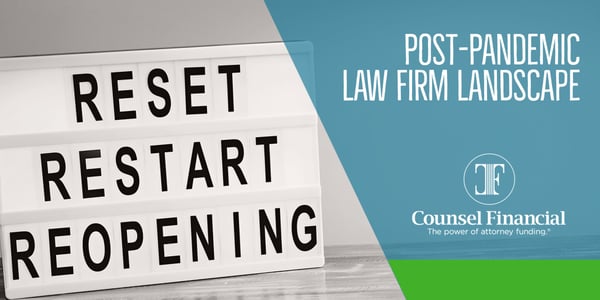Getting Back to "Normal": A Conversation with Amelia Warden


As law firms across the country continue to cautiously navigate the post-COVID landscape, many are reexamining what running a successful law firm looks like. For years, the thought of a remote or partially remote law firm seemed like an anathema to many lawyers. However, after successfully weathering over a year of restrictions due to the ongoing pandemic, many attorneys are seeing the benefits of embracing some of the virtual aspects of remote practice.
In this series, we are speaking to some of the all-stars of the plaintiffs’ bar to discuss how they are tackling the move back to “normal” firm life. We recently spoke with Amelia Warden, Chief Financial Officer of the renowned Flint Law Firm, to discover how her firm has changed over the past year-and-a-half and what the future holds for the firm.
CF: Having weathered well over a year of COVID-19 regulations and closures that impacted the court system, how has your firm changed in the last 12 months? Have there been any COVID-related adaptations that you think will become permanent additions to the way your firm is run?
AW: The pandemic has definitely changed our firm, but I think that all firms across the country have had to change and adapt this past year. One of the biggest things to change the way our practice is run is Zoom. As many firms can probably attest to, being able to successfully utilize Zoom for meetings and depositions has been really helpful over the past year with all the COVID limitations. Utilizing Zoom will definitely be a pandemic adaptation to firm life that we will continue to use going forward, even with the loosening of the COVID restrictions.
For us as a firm specifically, Zoom is helpful for us to stay in touch with each other, even when we are back in the office, because we have offices in Illinois, Kentucky and Texas, as well as having team members in Maryland, Florida and North Carolina.
CF: Zoom has been, and continues to be, an invaluable tool for many law firms. Being able to utilize technology, like Zoom, has made meetings more convenient for both attorneys and clients. Looking back, do you think that a lot of firms endured unnecessary travel pre-pandemic?
AW: I hate to say “unnecessary” because I do believe that it is so important to have that face-to-face relationship with our clients at certain times, but maybe it wasn’t always the most efficient.
CF: When it comes to efficiency, did your firm have any trouble adapting to working from home during the pandemic?
AW: Our team really adapted well and very quickly to working from home. I was really proud of them. I think it came as a surprise to a lot of firms, ours included, that you can run a successful practice outside of the brick-and-mortar office. I also think a lot of it comes down to attitude—if your team has a positive attitude and is willing to be a little flexible, that makes all the difference between success and frustration.
CF: Now that vaccines are more widely available, some firms are taking a hybrid approach to working from home and in the office. What is the Flint Law Firm’s plan going forward?
AW: In the past, our firm’s policy did not allow employees to work from home unless previously approved for various circumstances and we are going back to having our employees work in the office full time. However, we know that extenuating circumstances can arise and we want to be prepared for that if and when they do. For example, we have added quite a few new team members and rather than purchasing a desktop like we would have for non-attorneys in the past, we made sure they were equipped with laptops so that, if need be, they can work from home.
Running the firm successfully through the pandemic has definitely improved our firm’s overall confidence as a team because we know that we can get the job done, no matter what.
CF: That’s great that the firm is getting back into the office. What would you say is the aspect of “normal” firm life that you are most looking forward to?
AW: As a firm we are collectively so looking forward to getting back into the courtroom and seeing our clients face to face again! There are so many opportunities out there and the Flint Law Firm is definitely ready to hit the ground running.
CF: In recent years, women working in the arena of mass torts have made major strides towards equal representation, especially on plaintiff steering committees. Do you think the pandemic has had any effect on the progress that is strived for in the legal profession?
AW: Sadly, yes, I think the pandemic has been detrimental to the progress of a lot of female attorneys. I was speaking with Laci Whitley, a partner at our firm, about this topic and we both agreed that the pandemic has shown how the majority of people still see women as the primary caregivers of their children.
Speaking for myself, I was so thankful that I had flexibility at work during the pandemic but I know a lot of women didn’t have that. I think a lot of women were forced to put their careers on hold during the pandemic because their kids were home and needed to be looked after and essentially home-schooled when the schools were shut down. I hope that when things get back to whatever “normal” is now, that women are able to successfully get back into the workforce and regain whatever momentum they lost.
As vaccinations increase and the world tries to regain a level of normalcy, more and more firms will be faced with decisions surrounding the return to the office and the concept of flexibility. To read more from fellow plaintiffs’ attorney, click here.
Counsel Financial provides working capital credit lines exclusively for the plaintiffs' bar in all states except California, where credit lines are issued by California Attorney Lending.


